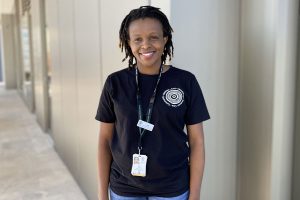
Joy Dunbar, STARS Risk Coordinator
Where have you joined us from?
I have been in the public health sector for a few years now, but in 2020 I had an exciting year with Zurich Group (in their medical and security assistance subsidiary). It was an eye opener on how far people travelled and the underlying global risks, until COVID-19 changed the world as we knew it.
I am from Kenya, though not a good runner.
Having gained a few qualifications and worked in a broad range of sectors with global coverage, I have an interesting and diverse background. However, public or population health resonates with me.
What does your role as Risk Coordinator – Safety and Quality involve?
A Risk Coordinator’s role, as the name suggests, involves engaging with operational areas to identify things that need to be prioritised to help keep staff, patients and visitors safe.
As part of the role, I also:
- help increase risk awareness (risk is mentioned nearly 200 times in the current edition of accreditation standards, which makes it core in our work respective of our roles)
- assist in assessing risks to better understand how they impact staff and or patients to inform what needs to be done, who will be responsible and by when
- report on how risks and their mitigation plans are progressing. These reports are also tabled at Metro North Health’s executive and board through my counterparts in Metro North so we work very closely to ensure that current and accurate information is provided.
Do you think risk is everyone’s responsibility? What’s something we can all do to be more risk aware?
Yes, risk management is everyone’s responsibility to help keep staff, patients and visitors safe. It’s something that we do every day in our personal and professional lives. For example, a commute to and from work involves many aspects of managing risk such as knowing what time to leave, when to give way, ensuring the vehicle has enough fuel, is registered, insured, etc. and now masking-up, and checking in via QR codes. Usually, the commute goes as planned with no hiccups. Occasionally, there could be things that cause delays such as road constructions or peak hour traffic (risk). Hence one can make adjustments by leaving earlier, using a different route or mode of transport such as public or riding to work. Certain things such as vehicle registration and driver’s licence must be done, but other times, there is nothing else that one can do, but accept it’s what it is (risk management).
STARS have a risk management plan for the current year, which I would encourage you to read as it provides more information on risk management at STARS.
What excites you about STARS?
There is a never a dull day at STARS; though it’s a specialised surgical and rehabilitation facility, operations are still dynamic and evolving. People are very passionate, knowledgeable and amazingly supportive. We have a rich diversity that makes work fun and inclusive, despite challenges faced as expected in any public health care setting, especially during these interesting times when the world is fighting a global pandemic.
What are three things we may not know about you?
- Usually on a Saturday morning, you will find me on my two feet on trails around Brisbane. My 7 and 4 year old kids have been lucky enough to spot a koala.
- My husband says that I change gears like a rally driver – a risk that I try to manage.
- Lastly, I am a Gemini which makes it hard to know much more about me – they say there is usually a dual side for Geminis.